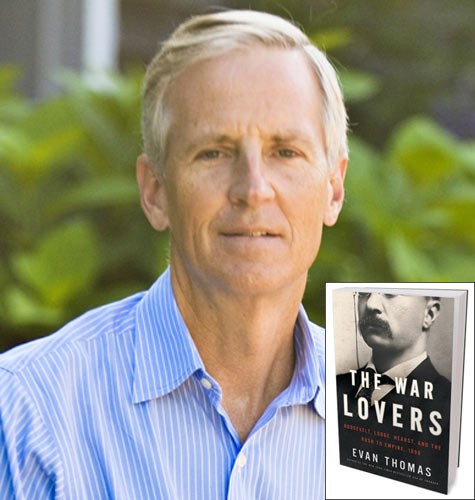
Photo: David Welch
|
How is writing a 50,000 word mini-epic, such as the Newsweek special report on a national election similar or different from writing and researching an almost 500 page book such as The War Lovers?
It’s all storytelling, both have the same rhythms. If you’re too slow and you lose the reader, it doesn’t matter what length the book is. You’ve got to engage the reader early and keep going. Campaigns are wonderfully suited to this because they’re thrilling quest stories. The greatest of all stories are quest stories and that’s exactly what a campaign is.
If your campaign cover story was a quest, how would you categorize The War Lovers?
It’s more of a tragedy, a tragedy of this noble urge to fight -- which, in many cases, although it is noble, it can also produce some unhappy consequences. The book ends with Teddy Roosevelt lamenting the death of his son, murmuring his name as he sits in his study pretending to read. So even for Roosevelt, the ultimate war lover, the price of war caught up with him.
Reviewers have noted that Teddy Roosevelt disproportionately dominates the ensemble of historic characters you assemble. Care to comment?
Yeah, I think the New York Times reviewer got it right, “Roosevelt sucks all the oxygen out of the room.” He is larger-than-life, that’s cliché, but in Roosevelt’s case, it’s actually true. I think all my characters are interesting and I think they’re all essential to the story, but you can’t write a book about Teddy Roosevelt that isn’t dominated by Teddy Roosevelt.
Women -- particularly Mrs. Lodge and Mrs. Cameron -- play cameo roles that may be small, but are nevertheless telling. How did you achieve this effect?
Because there was this powerful woman, Mrs. Lodge. Her husband, you know, was a stuffed shirt. But the one person who could puncture him was Nanny Lodge. Nanny’s name for Senator Lodge was “Pinky.” Edith Roosevelt was quieter, but nonetheless formidable. And she understood her husband and loved him and cared for him but also knew when to bring him down. She went down to Cuba after the Spanish American war and went to San Juan hill, and when she came back she teased her husband, that the hill he charged really wasn’t that big a hill, that it was kind of a small hill. She knew how to pop his balloon.
Another striking feature is the way you paint the Spanish Navy as it sails out to meet what was clearly anticipated as a crushing, humbling, and bloody defeat at the hands of the Americans. You imbue them with a stoic and rather noble resolve.